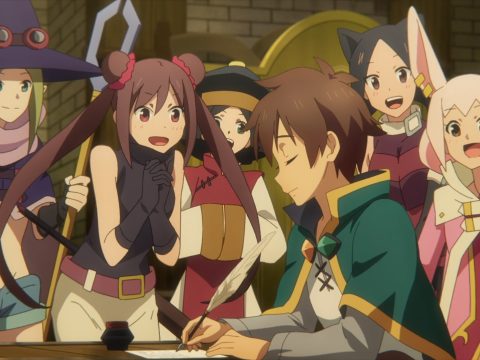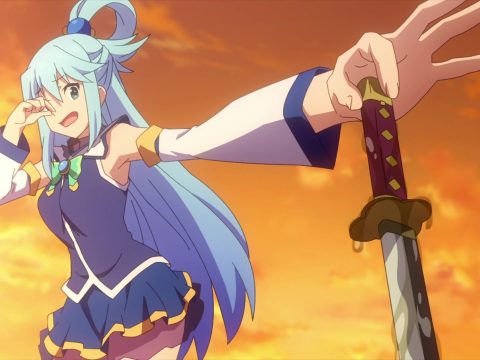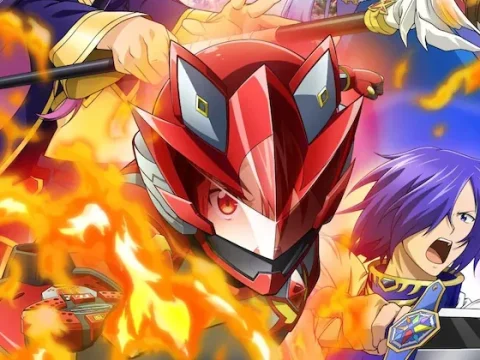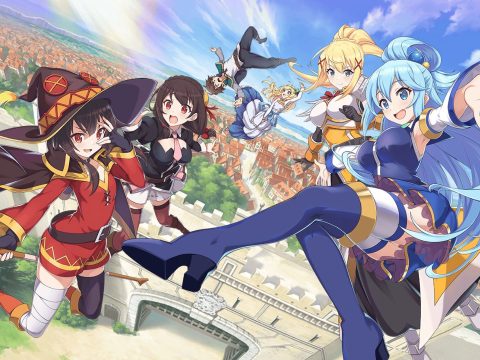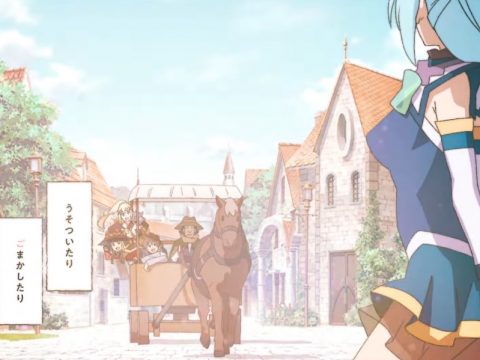
Heaven Can Wait
The world of light novel publication is a fast and furious affair where imitation is the highest form of flattery. When an idea hits it big, you can bet your bottom dollar (or your smallest yen coin) that a slew of series with similar premises will soon follow. For example, the international popularity of Harry Potter spawned dozens of books that feature overpowered protagonists studying magic in an academic setting, such as The Irregular at Magic High School and Anti-Magic Academy: The 35th Test Platoon. When Sword Art Online took off with young audiences, it prompted a surge in stories with a “trapped in a deadly MMORPG” premise.
Recently there’s been a run on the “reincarnated in a different world” setup, in which ordinary people from modern day Japan find themselves transported into worlds of high fantasy (Saga of Tanya the Evil, Grimgar of Fantasy and Ash). There are so many of these stories being pitched that publishers running light novel contests have banned entries with this premise since they were being buried beneath an avalanche of stories about people waking up/ resurrecting/reincarnating as super-powered heroes (or villains) in realms of magic and mysticism.

All of this is a roundabout way of saying that I was primed to hate KONOSUBA—God’s blessing on this wonderful world!, a 2016 light novel to TV anime adaptation with direction by Takaomi Kanasaki and animation by Studio Deen. KONOSUBA is a “reincarnated in a different world” series, but one that flips the script in the name of parody. In KONOSUBA, Kazuma Sato is a teenage NEET who dies in a spectacularly embarrassing fashion on the way to purchase the special edition of a hot new video game. In the afterlife, Kazuma meets Aqua, a goddess who offers to reincarnate him in a fantasy world where he will become a hero tasked with freeing the people from the Demon King’s reign of terror. Kazuma is allowed to pick one thing—such as a powerful artifact or a unique special ability—to bring along with him on his quest. When Aqua’s imperious attitude annoys him, Kazuma chooses to bring the goddess herself with him, and soon the not-so-dynamic duo are trapped—penniless, friendless, and homeless—in an unfamiliar world.
Kazuma is not exactly hero material. He’s petty, cowardly, lecherous, and fundamentally lazy, and Aqua isn’t exactly the brightest crayon in the box, either. Although they manage to register with the local guild as adventurers, Kazuma has no desire to level up and face down the Demon King. Instead he prefers to concoct numerous get-rich-quick schemes in an attempt to live a life of indolence and debauchery. However, the cruel economics of their situation force Kazuma and Aqua to undertake dangerous and difficult quests just to make ends meet.

Along the way, they inadvertently form a party with a pair of equally inept fellow adventurers: Megumin, an arch-wizard who channels all of her creative and magical energies into generating the world’s biggest explosion, and Darkness, a tough and powerful knight with poor accuracy and extreme masochistic tendencies. Together this group of misfits keeps accidentally thwarting the minions of the Demon King. They constantly “fail forward” in the process accumulating experience, notoriety, and the occasional massive debt.
By all rights, I shouldn’t love KONOSUBA. The characters are often spiteful and unpleasant, the animation is deliberately sloppy, the jokes are hit or miss, and the fan service frequently involves the kind of improbable breast physics that would make even Dead or Alive Xtreme Beach Volleyball creator Tomonobu Itagaki raise an incredulous eyebrow. I watched the entire first season of KONOSUBA—God’s blessing on this wonderful world! as it aired, but I didn’t exactly enjoy the experience, and I was ready to jump on social media and to argue with my friends about how the series wasn’t as entertaining as they claimed it to be. And yet each week I continued watching.
Then something magical occurred.

On January 12, 2017—just shy of a year after the first cour of KONOSUBA hit Japanese airwaves—the second cour of KONOSUBA debuted. Suddenly, joyously, everything clicked. The loose animation style and off-model characters transformed from an annoyance into a clear comedic choice. The characters’ off-kilter personalities grew on me. The fan service became less distracting. Jokes that felt half-formed before were skillfully made complete.
In Season 1, for example, Darkness’s extreme masochism was played as a joke onto itself. The fact that she adventures because she derives sexual pleasure from getting trampled by monsters and abused by the Demon King’s minions was the entirety of the gag, and it didn’t really work. In Season 2, Darkness still has the same kink, but there’s a new payoff: people witness her unstoppable perseverance in the face of punishment and mistake it for heroism, leading to all sorts of comic consequences as they comment on Darkness’s “bravery.”

Similarly, Megumin improves with the introduction of Yunyun, Megumin’s childhood rival. Yunyun represents all of the qualities that Megumin ought to possess: she is polite, intelligent, and well versed in a broad variety of magical arts. But whenever Yunyun challenges Megumin in a contest of skill, she gets walloped, because Megumin fights dirty. Even Kazuma’s calculated indifference begins to crack, and he shows signs of severe embarrassment when his friends impugn his already besmirched reputation.
The dissonance between perception and reality is where comedy thrives, and in Season 2, the mission statement of KONOSUBA—God’s blessing on this wonderful world! is crystal clear: it’s not enough to have a cast full of lovable losers. Instead, the lovable losers must triumph when they shouldn’t win—against all odds and at the expense of more capable and heroic characters—because adventuring is a sucker’s bet and this beautiful and wonderful world is comically, tragically unfair.

Crunchyroll currently streams both seasons of KONOSUBA—God’s blessing on this wonderful world! and at the time of this writing, the second cour is winding down. I’ve got my fingers crossed for a third season, because the misadventures of Kazuma, Aqua, Darkness, and Megumin have become the high point of my week, and to enjoy an anime comedy that’s genuinely funny and sharply satirical is a blessing indeed.
KONOSUBA—God’s blessing on this wonderful world! is available from Crunchyroll.
This story appears in the August 2017 issue of Otaku USA Magazine. Click here to get a print copy.


